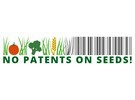No Patents on Seeds! is filing an opposition against a Nunhems (BASF) patent on watermelons (EP2814316) derived from conventional breeding. The bushy plants were originally discovered in a garden. They argue that the genetic predisposition to bushy growth occurred randomly. Nunhems has, in this case, simply used well-known methods to breed melons with less seeds from these plants. However, the main advantage of the plants is that they need less space to grow. However, these characteristics were detected but not invented. The patent covers the plants, the seeds and the fruits.
“Bush-type watermelon plants are already known from their countries of origin in Africa. This patent is an abuse of patent law, based on a fake invention, and meant to circumvent the legal prohibitions,” says Christoph Then for No Patents on Seeds!. “While BASF and the EPO are profiting from this situation, the public is being deceived.”
Patents on conventionally-bred plants are prohibited in Europe. The European Patent Office (EPO), which makes a profit from granting patents, has nevertheless found ways and means to circumvent the prohibitions: in this case, the plants, which were developed with commonly used methods to produce less seeds, are treated as a technical invention (increasing the number of chromosomes). However, this additional technical step is not necessary, not inventive and does not have any impact on the growth of the plants or the quality of the fruit.
“This patent is further evidence that the EPO is unable to enforce the laws. Moreover, the Administrative Council, which consists of experts and officials from the 38 contracting states of the EPO, and is meeting today, has utterly failed in its duties,” says Johanna Eckhardt for No Patents on Seeds!. “We are, therefore, demanding an international conference attended by the responsible ministers. This problem now has to be solved by national governments taking the initiative.”
"The EPO has added even more legal loopholes in recent years: random mutations are regarded as inventions in the same way as genetic engineering." No Patents on Seeds! is warning that an increasing number of patent applications are being filed for fake inventions. "For example, the applicants may try to create the impression that CRISPR/Cas gene scissors are being used, but in reality, the plants are derived from conventional breeding."
No Patents on Seeds! has started a petition which will lend weight to their demands for closing the loopholes in regulation and calls for an international conference of ministers.
For more information:
No patents on seeds!
Christophe Then
info@no-patent-on-seeds.org
www.no-patent-on-seeds.org
